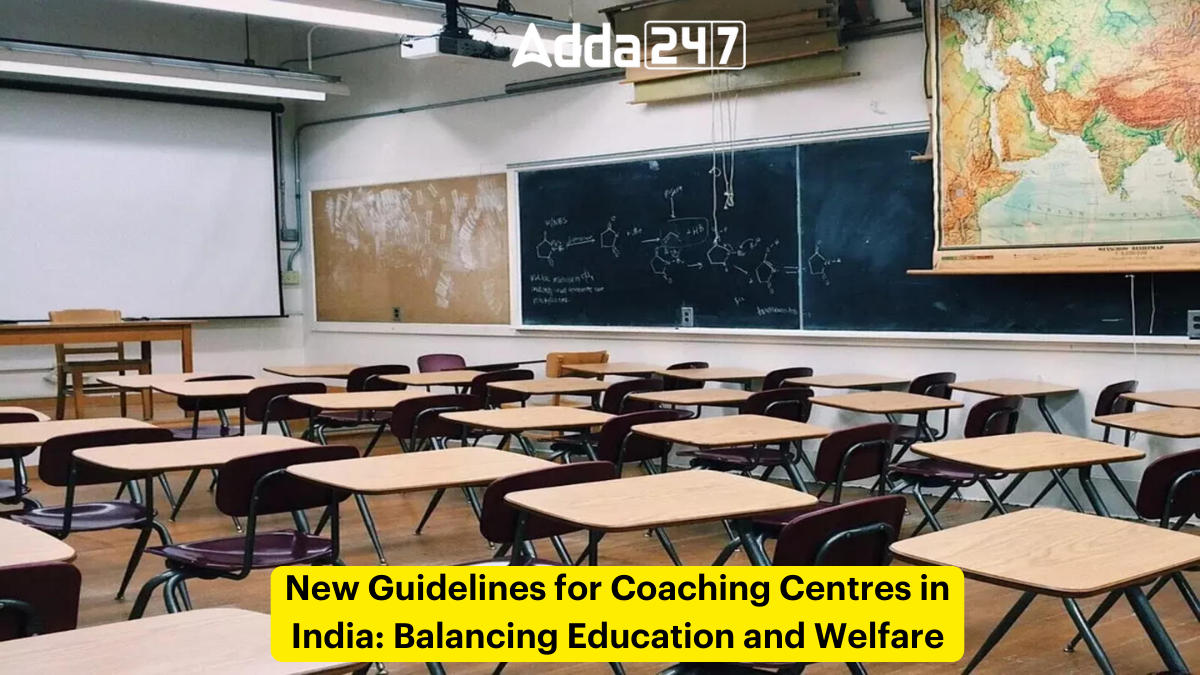In a significant move, the Ministry of Education in India has announced new guidelines for coaching centres. These guidelines come in response to growing concerns about student welfare, unregulated growth of private coaching, and rising cases of student suicides and other incidents linked to coaching centres.
Overview of New Guidelines
The Ministry’s guidelines aim to regulate the operation of coaching centres, ensuring a safer and more structured environment for students. Key features of these new regulations include:
Conditions for Registration
- Qualifications of Tutors: Only those with a minimum qualification of graduation are eligible to teach.
- No Misleading Promises: Coaching centres are prohibited from making false claims about ranks or marks to entice students.
- Age Restriction: Students below 16 years old cannot be enrolled, and admission is allowed only for post-secondary school examinations.
- Honest Advertising: Any form of misleading advertisement related to the quality of coaching or results is banned.
- Space Requirements: Centres must meet a minimum space requirement per student to be registered.
Objectives of the Guidelines
Establishing a Regulatory Framework: These guidelines provide a legal structure for the operation of coaching centres.
Setting Operational Standards: They define the minimum standards for the functioning of these centres.
Protecting Student Interests: The regulations aim to safeguard students’ rights and interests.
Holistic Development: There is an emphasis on co-curricular activities and comprehensive development.
Career and Psychological Counselling: To ensure the mental well-being of students, career guidance and counseling are encouraged.
Registration and Compliance
Coaching centres are required to follow a systematic registration process, adhering to the conditions laid out in the guidelines. This includes employing qualified tutors, refraining from false advertising, and implementing a student counseling system.
Addressing Fee and Infrastructure
The guidelines also tackle fee structures and infrastructure requirements, focusing on transparency, fairness, and the provision of essential facilities.
Fee Regulations
- Reasonable Charges: Fees should be fair and clearly communicated.
- Refund Policies: Conditions for fee adjustments and refunds for students leaving courses early are specified.
Infrastructure Standards
- Space Allocation: A minimum space per student is mandated.
- Safety and Amenities: Centres must comply with safety codes and provide medical facilities, proper electrification, ventilation, lighting, clean drinking water, and security measures.
Class Management and Co-Curricular Activities
The guidelines stress the importance of managing class schedules effectively, avoiding conflicts with regular school hours, and promoting co-curricular activities for all-round development.
Cancellation of Registration
Registration certificates can be revoked if a centre violates any guideline, but only after giving the centre a chance to present its case.
Government Initiatives Aligned with NEP 2020
In line with the National Education Policy (NEP) 2020, the government has taken several measures, including the Common University Entrance Test (CUET), entrance exams in regional languages, expanding HEI seats, and establishing high-quality HEIs. Additionally, the ‘National Test Abhyas’ Mobile App by NTA offers free high-quality mock tests for NEET (UG) and JEE (Main) aspirants.
Important Questions Related to Exams
Q1. What is the minimum qualification required for tutors under the new coaching centre guidelines in India?
A) High School
B) Diploma
C) Graduation
D) Post-graduation
Q2. What is the age restriction for student enrollment in coaching centres under the new guidelines?
A) Below 14 years
B) Below 16 years
C) Below 18 years
D) No age restriction
Q3. What is one objective of the new coaching centre guidelines?
A) Maximizing profits
B) Safeguarding student interests
C) Promoting misleading advertising
D) Ignoring co-curricular activities
Q4. What does the systematic registration process for coaching centres involve?
A) No specific requirements
B) Adhering to guidelines
C) Random inspections
D) Ignoring student counseling
Q5. According to the guidelines, what should coaching centres focus on for all-round student development?
A) Only academic subjects
B) Career counseling
C) Co-curricular activities
D) Only infrastructure
Q6 In case of guideline violations, when can the registration certificate of a coaching centre be revoked?
A) Immediately
B) Without notice
C) After a chance for representation
D) Only for severe violations
Q7. Which educational policy is the new coaching centre initiative aligned with?
A) National Testing Policy
B) Common University Entrance Test (CUET)
C) National Education Policy (NEP) 2020)
D) High-Quality Higher Education Institutions (HEIs) Policy
Kindly share your responses in the comment section.



 Ashwini Vaishnaw Inaugurates India’s 5...
Ashwini Vaishnaw Inaugurates India’s 5...
 Vriksharopan Abhiyan 2024 Launch in Dhan...
Vriksharopan Abhiyan 2024 Launch in Dhan...
 India's Installed Nuclear Power Capacity...
India's Installed Nuclear Power Capacity...
